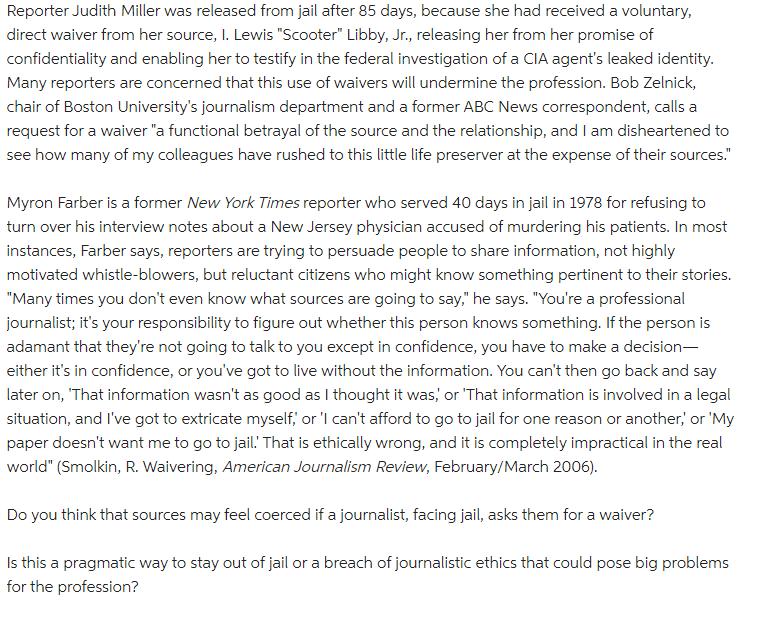Answered step by step
Verified Expert Solution
Question
1 Approved Answer
Reporter Judith Miller was released from jail after 85 days, because she had received a voluntary, direct waiver from her source, I. Lewis Scooter

Reporter Judith Miller was released from jail after 85 days, because she had received a voluntary, direct waiver from her source, I. Lewis "Scooter" Libby, Jr., releasing her from her promise of confidentiality and enabling her to testify in the federal investigation of a CIA agent's leaked identity. Many reporters are concerned that this use of waivers will undermine the profession. Bob Zelnick, chair of Boston University's journalism department and a former ABC News correspondent, calls a request for a waiver "a functional betrayal of the source and the relationship, and I am disheartened to see how many of my colleagues have rushed to this little life preserver at the expense of their sources." Myron Farber is a former New York Times reporter who served 40 days in jail in 1978 for refusing to turn over his interview notes about a New Jersey physician accused of murdering his patients. In most instances, Farber says, reporters are trying to persuade people to share information, not highly motivated whistle-blowers, but reluctant citizens who might know something pertinent to their stories. "Many times you don't even know what sources are going to say," he says. "You're a professional journalist; it's your responsibility to figure out whether this person knows something. If the person is adamant that they're not going to talk to you except in confidence, you have to make a decision- either it's in confidence, or you've got to live without the information. You can't then go back and say later on, 'That information wasn't as good as I thought it was,' or 'That information is involved in a legal situation, and I've got to extricate myself,' or 'I can't afford to go to jail for one reason or another,' or 'My paper doesn't want me to go to jail.' That is ethically wrong, and it is completely impractical in the real world" (Smolkin, R. Waivering, American Journalism Review, February/March 2006). Do you think that sources may feel coerced if a journalist, facing jail, asks them for a waiver? Is this a pragmatic way to stay out of jail or a breach of journalistic ethics that could pose big problems for the profession?
Step by Step Solution
★★★★★
3.41 Rating (170 Votes )
There are 3 Steps involved in it
Step: 1
The detailed ...
Get Instant Access to Expert-Tailored Solutions
See step-by-step solutions with expert insights and AI powered tools for academic success
Step: 2

Step: 3

Ace Your Homework with AI
Get the answers you need in no time with our AI-driven, step-by-step assistance
Get Started


